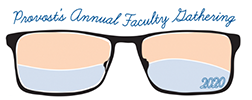Breakout:
In Google We (Dis)Trust: Fake News, Viral Outrage and Polarization on the Internet and Social Media
Time: 3 p.m. Breakout
Location: Harn Classroom 1
An interview of experts in 2017 identified one of the grand challenges of the 21st century as addressing the breakdown in trusted information sources. A majority of Americans agree.
Yet cyberspace has made it increasingly easy to ensconce ourselves in self-reinforcing communities of the like-minded where we hear, see and share only those facts—or fictions—that support our personal interests and ideologies. The internet and social media often insulate their users among ideological kin, and prompt them to distrust all others, heightening polarization. The prominence of disinformation and “click-bait” headlines designed to lure visitors onto fake news websites has exacerbated the trend.
The phenomenon of viral outrage has a similar digital fingerprint. Newspapers and news programs have long employed the criterion that “if it bleeds it leads.” Today, however, social media bleeds with far less restraint. Tweets, posts and pics that shock and morally outrage are shared more often, spreading faster and farther in cyberspace and hardening ideological worldviews.
This workshop will address the growth of polarized distrust the face of online misinformation and viral outrage, and explore avenues for responding creatively to the widespread disintegration of public trust.
Session type: DiscussionLearning Objectives:
- Recognizing the prominence and growth of polarized distrust
- Understanding structural contributors to online behavior that foments distrust
- Exploring creative responses by media platforms, governments, and citizens to the disintegration of public trust
Speakers & Panelists
Leslie Paul ThieleLeslie Paul Thiele is Distinguished Professor in the Department of Political Science and Director of Sustainability Studies and the Center for Adaptive Innovation, Resilience, Ethics and Science (UF CAIRES). His central concerns are the responsibilities of citizenship and the opportunities for leadership in a world of rapid technological, social, and ecological change. Recent publications include: "Human Rights at the End of Nature" (Journal of Human Rights); "Post-Sovereign Power and Leadership" (Contemporary Political Theory); "Digital Politics is the Game: See What Happens When Scholars Play It Well!" (Perspectives); and "Against our Better Judgment: Decision Making in an Age of Smart(er) Machines," (in The Political Economy of Robots).

